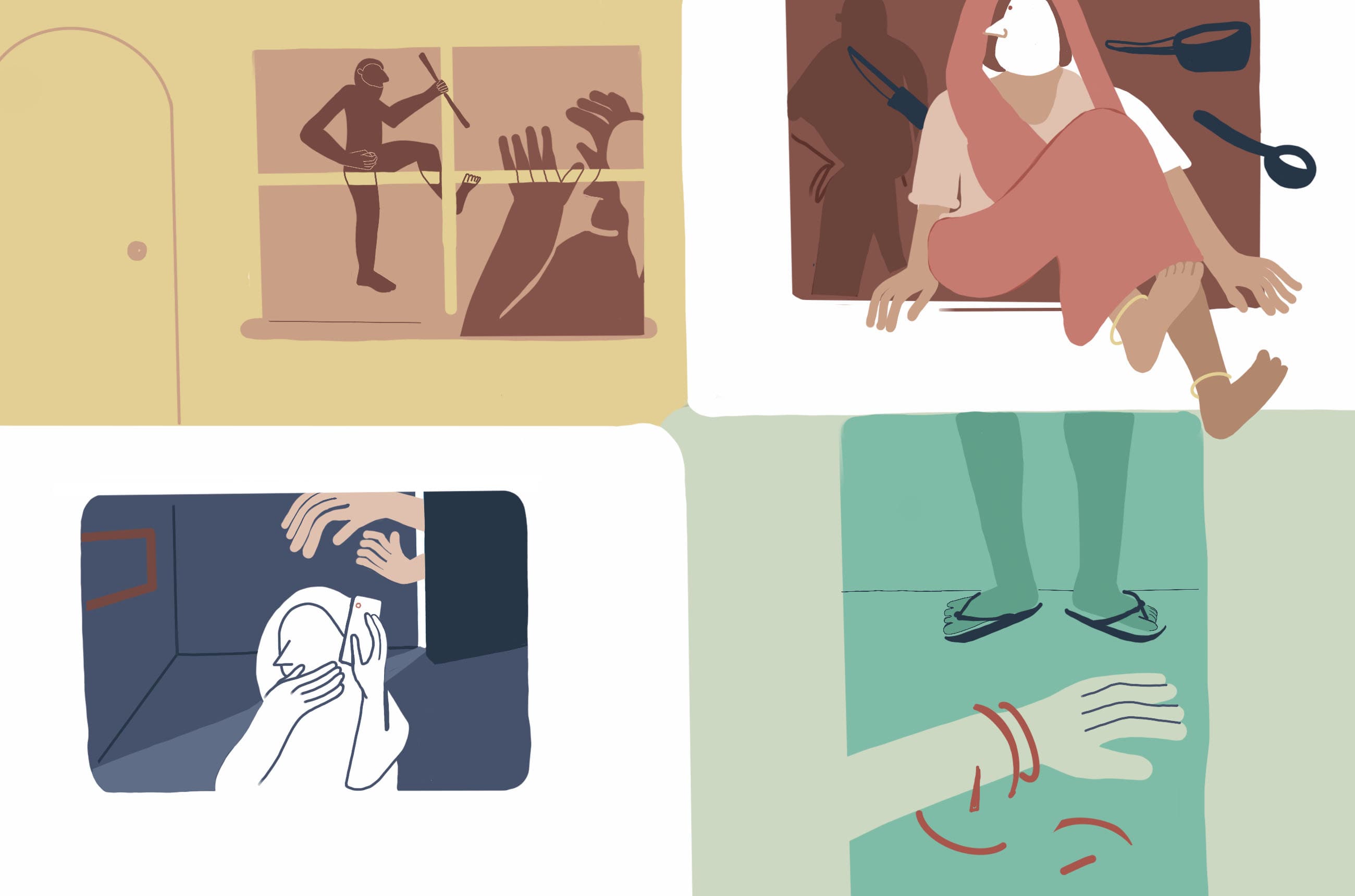Amid this Coronavirus situation, one hashtag is trending all over the internet i.e., #weareinthistogether. Are we all really in this together?
The Covid-19 crisis has substantially shown that there are cracks in our social, political and economical systems. The most prevailing of those cracks are gender inequality, discrimination against women and gender based violence. With the nation-wide lockdown, the negative consequences of shutdown have already fallen wide and deep on women. Activists globally have reported a steep rise in domestic violence cases in the wake of a massive lockdown imposed to flatten the curve.
According to India’s National Commission for women (NCW), there has been a surge in domestic violence cases. The NCW has recorded almost a two-fold rise in gender based violence across the country. The NCW has received 239 complaints from March 23 to April 16 as compared to 123 complaints received previously from February 27 to March 22. As the usual platforms for help are unavailable and the police are busy in enforcing the lockdown, Indian women find it difficult to report domestic violence to authorities. Rekha Sharma, the chairperson of NCW highlighted that the cases of domestic violence are high in Uttar Pradesh, Bihar, Haryana and Punjab. Sharma marked out that the main reason for the rise of domestic violence cases is that during lockdown men are at home and often take out their frustration on women. Jagori, an ngo for women has experienced a 50% drop rate in calls. It indicates that this is only the tip of the iceberg.
The lockdown has proved the phrase, wrong: “There is no place like home” as it doesn’t hold true for all women. For most women, it is a place where various forms of violence originate. Ever since the lockdown began, it has become difficult for women to escape as they are now trapped 24/7 with their abusers. Earlier, women could go to her parents or to a safer place to share her plight but the lockdown has closed this window rendering them more vulnerable. For a fraction of women where home is a safe haven, it becomes a place of abuse for many.
Women from the lowest strata of society are worst hit and have been perilously exposed to various forms of dangers. With the job loss, non-availability of any communication device, restricted movements and cooped up in small spaces, it’s the women who bear the brunt of frustration of their grumbling lots. A 38-year-old Maharashtrian woman who works at a local bidi manufacturer informed Snehalaya, an NGO how her small world turned upside down as her husband, deprived of alcohol became violent, abusive and a potential rapist during lockdown.
Like most countries, the Indian government too allowed liquor stores to reopen on May 4 in an attempt to earn some much-needed tax revenue. After the government lifted a ban on alcohol sales, several groups of women protested outside the liquor shops and warned that it would fuel domestic violence. Although alcohol is not the root cause of domestic violence but societal beliefs emphasize that alcohol causes aggression and even encourages violent behaviour after drinking, which further leads to alcohol being used as an excuse for violence. But there is no scientific proof emphasizing a cause-and-effect relationship between alcohol and gender based violence. Rather it is about exertion of power and control over another. However, the World Health Organisation says that it may be the contributing factor, often reduces self-control and leaves people less capable of negotiating tensions within relationships.
During lockdown, India witnessed a steep rise in sexual violence against women. The complaints of rape or attempted rape have risen from 2 to 13, reported the NCW. In a horrifying incident, a migrant woman from Gaya in Bihar was allegedly sexually assaulted by a healthcare worker for 2 days. She died on April 6 due to excessive bleeding. It is interesting to note that our society and media mainly focuses on sexual cases that often involve a stranger. It gives an untrue picture that women cannot be raped by their own people. As per National Crime Records Bureau (NCRB) data, 94% of reported rapes are committed by offenders known to the victim/survivor.
Women are confined in homes with their partners, it would lead to unwanted pregnancies as they are out of reach of birth control and other sexual and reproductive health needs. Furthermore, most will result in unsafe abortions. With no public transport, pregnant women in Assam from poor families have been struggling to reach hospitals, said a report by India today. A migrant woman was recently forced to give birth on the roadside who was walking back to her village in Madhya Pradesh. What adds more to the horror is the fact that she had to walk another 150 kms just after two hours of her delivery, before she could find any help.
Another fear among pregnant women has risen that they along with their newborn babies might come in contact with a covid-19 positive patients or medical staff. The sudden lockdown resulted in the closing down of a considerable number of private hospitals and essential medical services (like obtaining Antenatal Care Services which have a potential risk of causing health complications and consequential maternal and child mortality) will continue to affect women’s health.
The situation has gotten worse for working women during lockdown with additional work pressure and no empathy from their bosses for the double workload. The lockdown, in turn, has affected her quality of life, work, leisure time, health and her access to learn something new and other opportunities.
A study by Australia-based researcher Jacqui True highlighted that if gender-based violence and the particular needs of women are not addressed in outbreak management measures, then women and girls’ vulnerability will increase. In India, there are laws like The Protection of Women from Domestic Violence Act 2005 (later amended in April 2013), the Criminal Law (Amendment) Act 2013 and the Scheduled Castes and Scheduled Tribes (Prevention of Atrocities) Act to address gender-based violence. However, Human Rights Watch (HRW) observed the cracks in enforcing them to seek justice.
Governments have introduced various policies to deal with the pandemic which reflect a lack of gender-sensitivity. One such example is the Malaysian’s Ministry for Women, Family and Community Development which issued online posters (later abandoned the campaign) on social media for women to help with the country’s partial lockdown by not nagging their husbands. They advised women to refrain from being sarcastic if they asked for help with household chores. It also urged working women to dress properly and to wear make-up. Malaysian movement control order specified that only the head of the household should leave the house to find basic groceries without assistance.
Many civil societies groups around the world have warned governments to be ready for an outpouring of cases once the lockdown is lifted. Many groups around the world are demanding that women should be provided with counselling, medical treatment and legal aid. Sadly but not surprisingly, the discussion of how half the world’s population is absent from this outbreak management measures. Apparently, this pandemic reminds us to acknowledge those cracks which need to be fixed to deal with such outbreaks in the future, paving the way for gender equality both in private and public spheres. Therefore, it requires the critical gender lens to address this outbreak which could otherwise set women back by decades.

